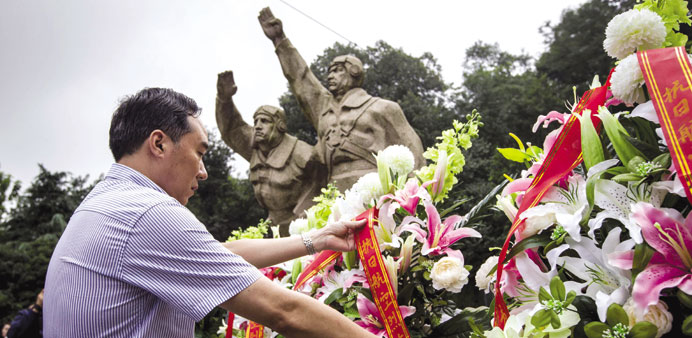A man places flowers for people who died in battles against Japan during World War II before a
monument at the Aviation Martyr Memorial to commemorate the 69th anniversary of victory over Japan in World War II in Nanjing, east China’s Jiangsu province yesterday.
Chinese President Xi Jinping and all six other members of the Politburo Standing Committee, the country’s most powerful body, made a rare public appearance yesterday to commemorate 69 years since Japan’s surrender at the end of World War II.
The ceremony was the first since Beijing earlier this year declared September 3 as a national day to mark Japan’s defeat - it signed the formal surrender on board the USS Missouri in Tokyo Bay on September 2, 1945, with China celebrating the following day. Relations between the two countries are currently mired in bitter disputes over territory and history.
Xi used the occasion to urge Tokyo to “admit and reflect on its history of militarist aggression”, according to a report by Xinhua news agency.
“China will never allow any denial and distortion of this history of aggression or any return to militarism,” Xi was indirectly quoted by the news agency as saying. “Japan must show a sense of responsibility for history, the region’s people and the future,” Xi added.
Hundreds of veterans, officials, military personnel, schoolchildren and young people in traditional ethnic minority dress gathered at a museum near the Marco Polo Bridge on the edge of Beijing, where a skirmish between Chinese and Japanese troops in 1937 triggered full-scale war.
Opening the ceremony, Premier Li Keqiang called on the crowd to “pay a silent tribute to martyrs who bravely sacrificed their lives in the War of Chinese People’s Resistance Against Japanese Aggression”, as the conflict is known in China.
Xi and his six colleagues on the ruling party’s top committee presented seven flower baskets in front of sculptures of “martyrs” inside the museum, with China Central Television broadcasting live.
China’s Communist Party has long used nationalism as part of its claim to a right to rule.
It stresses that under its leadership, which began in 1949, China finally overcame more than a century of humiliation by outside powers dating back to the Opium Wars of the 19th century.

